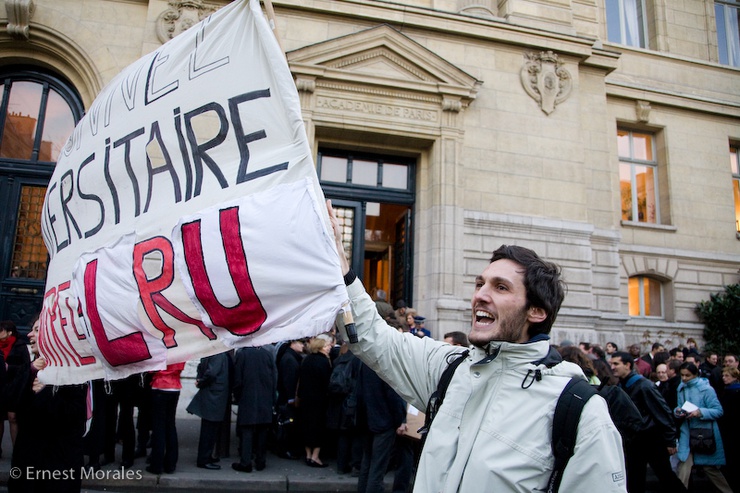
Education: Bologna process, sales time in French universities
Published on
Translation by:
 rhiannon_nicolson
rhiannon_nicolson
France is infuriated. The resentment felt towards the Bologna process, aggravated by the repercussions of the economic crisis, has driven students to go on a general strike as a demonstration of their 'anti-privatisation' feelings. They fear that their future is going 'at reduced prices'. We test the water in Clermont Ferrand
In the corridors and classrooms of universities in Clermont-Ferrand – a city in the very heart of France and the birthplace of Michelin and the ex-president of the centre party, Valéry Giscard d’Estaing – the minister for education and research, Valérie Pécresse, is setting tongues wagging with a new law. Nicknamed ‘Valérie’s Law’, the introduction of which the minister wants to be effective immediately.
Over the next five years, universities will be granted full autonomy not only in budget allocations, but also in human resources management
One implication of the law would be that over the next five years, universities will be granted full autonomy not only in budget allocations, but also in human resources management. That is to say, an autonomy to allow private business to finance research, and autonomy for every university dean to execute decisions on hiring and work schedules of professors and researchers.
The deans are all for it
Philippe Dulbecco, dean of the University of Auvernia in Clemont-Ferrand, confirms that the law, which has been in effect since 1 January 2009 in twenty French universities, will allow each university to choose its own model for development.

'We plan to invest in areas involving research and PHds, in mobility programs and in strengthening relationships with big businesses, such as in Romania, Ukraine, Belarus and China, where we also have a presence,' says Dulbecco. By granting autonomy to universities, the management of resources will become easier. As the 'future ambassadors' of the university, students will have a greater range of options in their grasp. Ultimately this would help them in finding employment and throughout their future careers.
At the University of Blaise Pascal (UBP) in Clermont-Ferrand, the current situation is somewhat different. The law still hasn’t come into effect; everyone is holding their breath. Dean Nadine Lavingotte maintains that 'on the European stage, education is experiencing a time of great upheaval and profound change, which have stemmed from the Bologna process. It’s normal that the law’s introduction has caused some uncertainty.'
 'We’re dealing with a law that is worrying people, as it involves decentralisation and a rapid and profound change. Perhaps the greatest advantage is the opportunity it presents to carry out a detailed analysis of the operation and management of universities from an external viewpoint,' remarks Lavingotte. The deans of both universities agree that research, mobility and educational exchanges are the areas which need immediate action, and are also the areas which will receive the most budget funds.
'We’re dealing with a law that is worrying people, as it involves decentralisation and a rapid and profound change. Perhaps the greatest advantage is the opportunity it presents to carry out a detailed analysis of the operation and management of universities from an external viewpoint,' remarks Lavingotte. The deans of both universities agree that research, mobility and educational exchanges are the areas which need immediate action, and are also the areas which will receive the most budget funds.
Students stand up for their rights
In the midst of this nation-wide anxiety triggered by the introduction of new educational directives and reforms, the protests against the LRU, as it is more commonly referred to by Gallic students, resound in the corridors of both universities.
 Two student associations are airing their complaints and feelings of powerlessness in the face of the introduction of the 'damned law'. Florent Naranjo, a member of UNEF, the main student union, classifies the privatisation of the public service as an abomination. 'Education is not a privilege. It’s an invaluable service for all,' says the history student, who brings the negative repercussions of the law to the foreground, as far as human resources are concerned.
Two student associations are airing their complaints and feelings of powerlessness in the face of the introduction of the 'damned law'. Florent Naranjo, a member of UNEF, the main student union, classifies the privatisation of the public service as an abomination. 'Education is not a privilege. It’s an invaluable service for all,' says the history student, who brings the negative repercussions of the law to the foreground, as far as human resources are concerned.
With a similar aim, but a somewhat different approach, AGEC (the general association of students in Clermont-Ferrand) has shown itself to be 'open to negotiations,' explains Simon Vernet, a law student and member of the editing team of the university’s newspaper, Le Canard Engagé (its name is inspired by French satirical paper 'Le Canardenchaîné', and literally means 'The Politically Engaged Paper').
Simon finds that amidst the breakdown of communication, AGEC’s aim is to express constructive criticism via diplomatic means, and encourage dialogues on how to work together to resolve this disastrous situation. Many French students and professors echo these sentiments and warn people that 'we are heading towards a loss of equality and funding in faculties, as well as reductions of staff and professors in universities.'
Protest has become pan-European
So far, Greek, Spanish and Italian students have led the way in protests across Europe's universities, where the mutual feeling is one of 'anti-reform'. Now it’s France’s turn to protest, and she has begun 2009 more active than ever before. The protests against the system carried out by young Greeks in the last few months reflect their feelings of frustration in regards to their professional futures and also the gap between their aspirations and what universities have to offer them. In Spain, the reaction against the process has driven president Jose Luis Zapatero to announce plans for change and an increase in the number of scholarships.
In Spain, president Jose Luis Zapatero increased the number of scholarships
On 10 February, professors and researchers in France joined the protest against the Pécresse reforms in the nation’s major cities, even though the day before the minister had promised to 'revise' the bill. The outrage in the streets speaks for itself: the minister’s words were clearly not believed, at least not by those that protested – estimated between 40 and 100 thousand individuals – who took to the streets of Paris, Lyon, Grenoble and Clermont-Ferrand. UNEF in Clermont-Ferrand, via its avalanche of fluorescent leaflets, urged that the arranged protest on 29 January was not to be missed, as were all the subsequent protests, so that students could fight for their future which is currently going 'at reduced prices'. All that’s needed now is for a mediator between the minister and professors to be chosen to facilitate drawing up a new legislative text.
Translated from Proceso de Bolonia: la universidad francesa en época de rebajas


